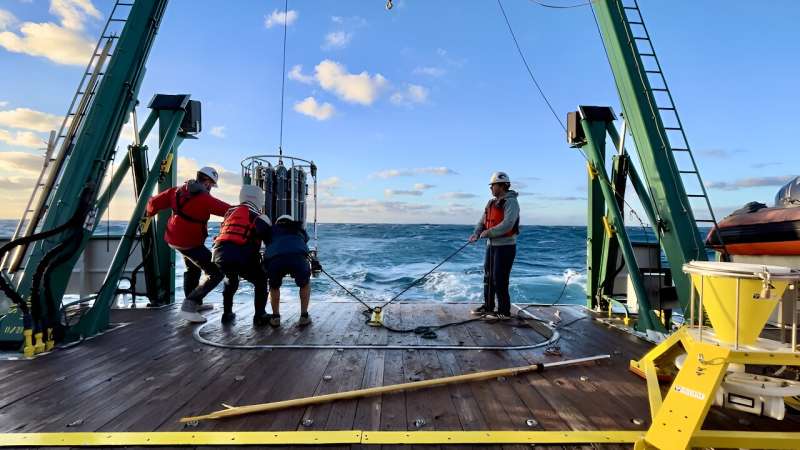This article has been reviewed according to Science X's editorial process and policies. Editors have highlighted the following attributes while ensuring the content's credibility:
fact-checked
peer-reviewed publication
trusted source
proofread
South Florida's nearshore reefs less vulnerable to ocean acidification, study finds

Researchers studying South Florida's coral reefs found that the region's nearshore reefs and more sheltered inshore areas are less vulnerable to ocean acidification than previously thought—a major climate-related threat to coral reefs as ocean waters absorb more atmospheric CO2 from the burning of fossil fuels.
This new study, led by scientists at the University of Miami Rosenstiel School of Marine, Atmospheric, and Earth Science offers a glimmer of hope for Florida's iconic coral reefs as ocean acidification, along with marine heat waves and other climate-related threats are impacting coral reefs worldwide.
"In contrast to many regions globally where ocean acidification is being exacerbated, we found that South Florida's inshore reefs—and sheltered areas that co-exist with seagrass communities—are being buffered from the negative effects of acidification," said the study's lead author Ana Palacio-Castro, a researcher at the Rosenstiel School-based NOAA Cooperative Institute for Marine and Atmospheric Studies.
Ocean waters absorb atmospheric carbon dioxide, which results in a drop in pH levels, turning the water more acidic. This resulting ocean acidification impacts the ability of a wide range of marine life —from corals to clams—to build and maintain their calcium-based shells and skeletons, and ultimately compromises the structural integrity of coral reefs and the marine life that rely on them.
In this study, the researchers analyzed 10 years of continuous seawater samples collected at 38 monitoring stations across the Florida Reef Tract to assess carbonate chemistry variability among seasons, years, and reef areas, including ocean acidification. They looked at differences between Biscayne Bay and the Upper, Middle, and Lower Keys, and the inshore, mid-channel, and offshore reef zones.
The study, titled "Coral reef carbonate chemistry reveals interannual, seasonal, and spatial impacts on ocean acidification off Florida," was published in Global Biogeochemical Cycles.
The results showed potential ocean acidification refugia in inshore reefs with neighboring seagrass meadows as a result of enhanced primary production, highlighting the importance of the relationship that exists between coral reef and seagrass ecosystems to mitigate the impacts of future climate changes.
The results also suggest that Florida's inshore reef structures could benefit from local mitigation strategies, such as reducing CO2 emissions, marine carbon dioxide removal or conserving intact seagrass meadows, according to the researchers.
"The findings underscore the importance of local monitoring to understand how ocean acidification is impacting our region and to identify potential acidification hotspots and refugia," said Ana Palacio-Castro.
More information: A. M. Palacio‐Castro et al, Coral Reef Carbonate Chemistry Reveals Interannual, Seasonal, and Spatial Impacts on Ocean Acidification Off Florida, Global Biogeochemical Cycles (2023). DOI: 10.1029/2023GB007789
Journal information: Global Biogeochemical Cycles
Provided by University of Miami




















